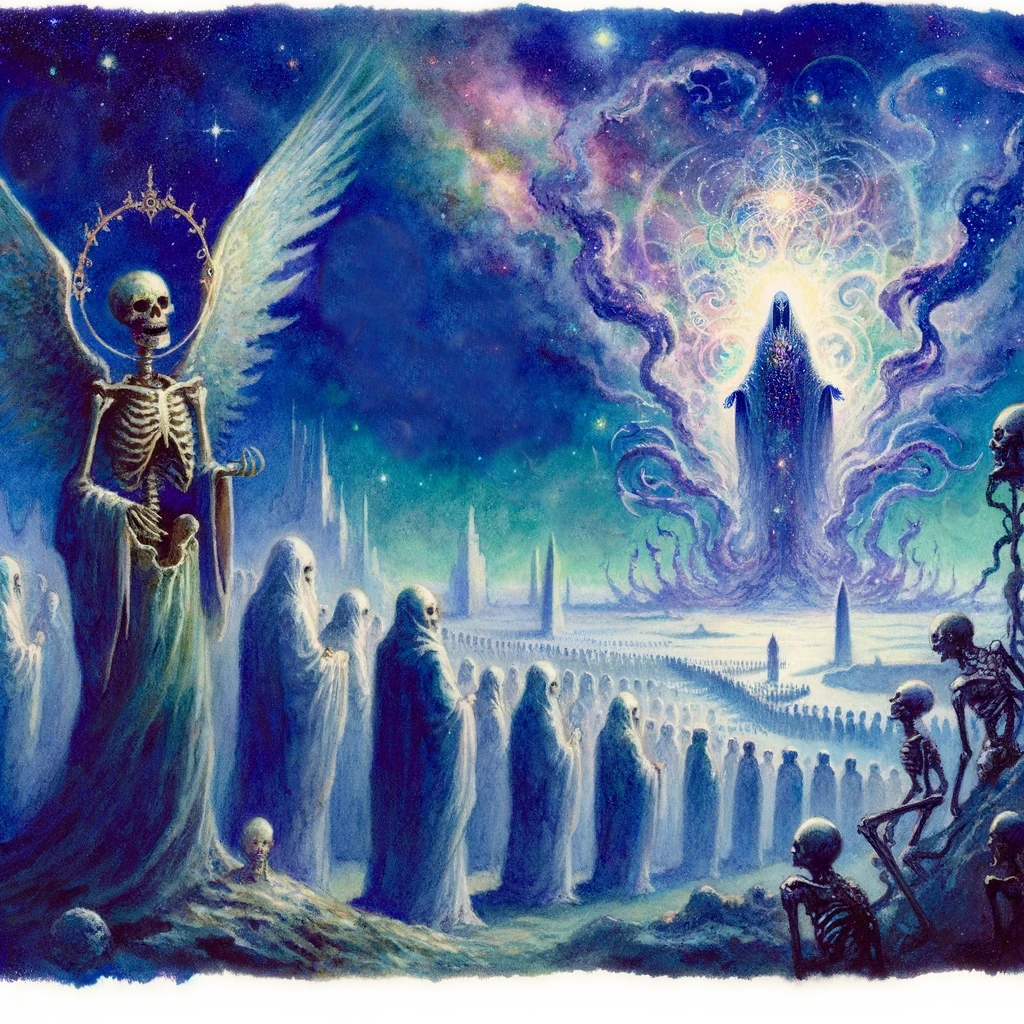Ecology of the Psychopomp
See also:
You want to know the dark of psychopomps, eh cutter? Lemme break it down for you. These bloods aren’t talked about that often round these parts you know. Superstition, see? They say if you speak the name of the grim reapers, that only attracts them towards you. And only an addle-cove would want to draw the attention of the angels of death, right?
First things first, their barmy sounding name. Apparently in the language of the Olympian pantheon, it means ‘soul guides’. Why the Olympians get to name everything, that’s a story for another time, eh? Because people don’t want to use the names of these creatures directly, the name ‘psychopomps’ sort of stuck. Whether that means we’re safe here talking about them is anyones guess. That’s why I live in Sigil, see? The spooky cutters rarely come here. We’ll talk about that later.

Anyway, these bloods ain’t from the Material Plane like the mortals they obsess over. Well, it’s not the mortals they’re interested in so much as their souls. No, not like night hags, they’re not trying to enslave them. Think of ’em as the caretakers of souls, guiding them from the living realm to whatever comes next. They don’t do it out of the kindness of their hearts, mind you cutter, but to keep the shape of the Outer Planes in balance. The purpose of the psychopomps is all about the soul’s journey – from life, through death, and back again. This cycle’s called the River of Souls, and it’s probably the biggest deal in the multiverse.
These psychopomps are tasked with making sure souls get where they’re supposed to go, protecting them from predators along the way, and preventing any barmy souls from disrupting the flow of the River, especially those undead ones.
Now, every psychopomp dances to the tune of one high-up: Pharasma. She’s the power of the River of Souls, and ultimately the blood who decides where souls end up. Her word is law, but she’s not one for micromanaging. She’s more of an enigma to be honest – spouting prophecies and cryptic messages that her minions scramble to interpret. The chant goes she’s also one of the oldest being in the Multiverse.
So while they all serve Pharasma, it ain’t like they’re all thinking with one brain-box. Psychopomps have each got their own takes on her orders, which can lead to some real head-scratchers and even infighting. They’re left to figure out the nitty-gritty themselves, which sometimes means they end up working at odds.
Psychopomp Society
So, most berks think that once they give up the ghost on living, they’ll have a sit-down with Pharasma for a spot of judgment—or whatever name she’s given on their backwater Prime world. That’s about the shape of it, but there’s more to the dark than that. Pharasma’s gaff, the Boneyard, is slap-bang in the heart of the Outer Planes. It’s a mix of law and chaos, filled with endless lines of souls waiting for their turn in the dock. But wait, I hear you cry, ain’t Sigil the heart of the Outer Planes? Well cutter yes—and no. For the same reasons cutters don’t talk about psychopomps much they also don’t mention where they make their kip: the Underlands. Imagine the Outlands as a disc with the Spire at the centre and the gate towns at the edge. Well, flip that disc over and you get the Underlands; the Upside Down of the Outlands. It’s a weird place for sure, but you’ll have to find some other berk to lann you the chant on that. Suffice to say, psychopomps are to the Underlands as the rilmani are to the Outlands. Mostly.
Now, the bulk of the Underlands is a huge realm called the Boneyard, and this is where the travellers of the River of Souls usually wash up. Ever wonder why the Outlands isn’t overrun with spirits? Thank the Underlands for that berk. Here you’ve got a whole army of psychopomps working like barmy clerks. Some are herding souls, some comforting them and explaining what happens next, some are helping out the high-ups, and others are acting as judges. While Pharasma’s the ultimate high-up, she lets her minions handle the day-to-day.
Every psychopomp is like a little slice of Pharasma’s will. They keep the souls moving through this vast courthouse-cum-library setup. It’s all about keeping the queue moving, but sometimes a soul’s case is so knotty that they get bogged down in the red tape, waiting for the higher-up courts of psychopomps to chew over their fate and work out where to send them.
Outside the Boneyard, some psychopomps are out and about on the planes, fixing screw-ups, keeping an eye on the flow of the River of Souls watching for any currents, eddies or tsunamis of souls that follow natural disasters, which can threaten to overwhelm the Boneyard. There are also those who look into any funny business in the Astral. They’re particularly keen on nabbing any sod who messes with the flow of souls, like yugoloths, hags or soul traders.
But what most primes think of when they hear ‘psychopomp’ is the guide who leads lost souls back to the River of Souls. That’s a big part of their gig. They’re not there to hold your hand or scare your britches off (though their spooky looks often do just that), but to get you where you need to go.
Psychopomps and Petitioners
See, every sod that kicks the bucket is just finishing a long dance that’s been going on for eons. But don’t think that makes ’em special in the eyes of psychopomps. To these berks, the dead are more of a job than a joy. They see ’em as a responsibility, sometimes even a right pain in the lower planes. The ones who get to the Boneyard without making a fuss are a bit easier to handle. The psychopomps prefer it when the dead just toe the line, wait their turn to get judged, and then move on to whatever’s next.
It’s not like psychopomps have it in for the dead or anything. It’s just that there’s an endless stream of ’em, each with their own potential for trouble. And it’s always down to the psychopomps to sort out these problems, problems they’ve probably seen and solved a million times over. Dealing with the dead is baked into their very essence, a never-ending task.
If you ever see a psychopomp looking cheery, don’t be fooled. It’s not like they’re having a laugh. More likely, it’s just the way their bony or beastly mugs are shaped. They’re not here for a good time; they’re here because they have to be, endlessly minding the dead as part of their cosmic duty.
Psychopomps and Planars
To psychopomps, the living have got a simple gig: live for a bit and then get dead-booked. That’s it. But leave it to the berks to muck up even the simplest things. Psychopomps don’t usually bother with the living, unless some addle-cove starts messing with the River of Souls in a big way. We’re talking archmages destroying souls for dark magics, knights of the post figuring out how to dodge the final judgment, and the like. These sorts are asking for a visit from the psychopomps once they tumble to the dark of that’s going on. Necromancers? They’re not exactly the toast of the psychopomp town, but as long as they’re only dabbling in the soul business for a life or two, they’re generally left to their own devices.
Now, when psychopomps do take issue with mortals stepping on their toes, they’re not shy about cutting those lives short. They don’t make a hobby of it, mind you, but if dead-booking a few mortals keeps the cosmic scales balanced, they’ll do what they must. Mortal lives and their experiences add their own spice to the planes, so psychopomps would rather not snuff ’em out prematurely. But in the grand scheme, sending a few souls early to the Boneyard is a small price for keeping everything on the level.
As for Pharasma’s worshippers, they shouldn’t hold their breath waiting for an invitation for tea and cakes with a psychopomp. These celestial bureaucrats aren’t exactly the social sort. When they do have to deal with the living, it’s usually with a frosty demeanor and maybe a backhanded ‘thanks for dying eventually.’ It’s nothing personal, just business – cold, indifferent, cosmic business.
Psychopomps and the Undead
So, psychopomps have this side gig alongside their main duties for Pharasma: Writing the undead into the dead-book properly. These shambling, unliving sorts muck up the works of the River of Souls, see? They’re like clogs in the cosmic pipes. If a psychopomp stumbles upon an undead creature while on the job, it’s usually curtains for the bony berk, unless it messes with their other tasks. If the undead is too tough a nut to crack on the spot, the psychopomp will throw a wrench in its plans and then report back to the Boneyard for backup.
Now, don’t think psychopomps are all black and white about this. They know everything’s got its use, even the undead. Sometimes they might even team up with one for the greater good of the balance, but it’s always a short-term deal. Some graybeards scratch their heads over psychopomps not being more gung-ho against the undead. For psychopomps, it’s a game of priorities—they’re not about squashing every skeleton that pops up.
The common chant is that psychopomps should be leading the charge against big undead threats, like zombie apocalypses or ghostly empires. But in truth, they’re more the behind-the-scenes types. Psychopomps prefer working through the living, letting mortals handle their own messes. Chalk it up to a learning experience for ’em, see? And while they might not jump at every undead outbreak, the psychopomps have got a long view on things. Undead empires tend to rot from the inside after a while, becoming their own worst enemies.
But, if there’s something really big brewing, like a planar tear or a threat to the River of Souls, then you can bet your last green the psychopomps will step in. Otherwise, they’ll send in a lone agent, and only when they get around to it. They’re not in the business of making life fair; they’re there to keep the River of Souls flowing smoothly, nothing more.
Psychopomps and Powers
So, psychopomps, they’re not the sort to kneel and pray to the gods. They’ve got this unique perspective, see? They know that even gods can snuff it, and when they do, they get processed in the Boneyard just like any other soul. Well, perhaps not quite like any other soul, you can bet Pharasma will stick her beak in on these case, but still. This gives psychopomps a sort of blasé attitude towards gods and religions. They understand that belief shapes lives and the planes, but to them, it’s all part of the cosmic routine, like a well-rehearsed play.
Most psychopomps are savvy enough, or just don’t care enough, not to rattle their bone-boxes about this. They see the value in letting the faithful enjoy their beliefs without raining on their parade. Stirring up philosophical debates is a waste of time for these eternal beings. And it only makes the Athar gloat.
Even among their own ranks, psychopomps don’t dole out reverence willy-nilly. Take the psychopomp ushers, for example, the paragons of the race—think Abyssal Lords only hold the Abyssal. These top-tier death wardens are basically demipowers, running parts of the Boneyard or sitting as high judges. They’ve got a lot of clout, deciding the fates of countless souls. But here’s the thing: Most of them started out as regular psychopomps, working their way up over eons. So, while they get respect from their peers, it’s a cool, measured sort of respect. There’s always that reminder of their humble beginnings, keeping any potential egos in check. Except for the egos of the Godsmen—those bashers love to rattle on about how psychopomps prove their philosophy. Well… until the faction imploded, ha!
In short, psychopomps are all about the job at hand, not getting caught up in divine fanfare or hero-worship, even among their own. They reckon they’ve seen it all, from the fall of gods to the rise of their own kind to power, and they keep a level head through it all.
Source: ‘Ecology of the Psychopomp’; War for the Crown 3 – The Twilight Child [PF1e] p68. Planescapified by Jon Winter-Holt, mimir.net.


